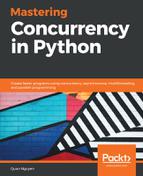What is starvation, and why is it undesirable in a concurrent program?
Starvation is a problem in concurrent systems in which a process (or a thread) cannot gain access to the necessary resources to proceed with its execution, and therefore, cannot make any progress.
What are the underlying causes of starvation? What are the common superficial causes of starvation that can manifest from the underlying cause?
Most of the time, a poorly coordinated set of scheduling instructions is the main cause of starvation. Some high-level causes for starvation might include the following:
- Processes (or threads) with high priorities dominate the execution flow in the CPU, and thus, low-priority processes (or threads) are not given the opportunity to execute their own instructions.
- Processes (or threads) with high priorities dominate the usage of non-shareable resources, and thus, low-priority processes (or threads) are not given the opportunity to execute their own instructions. This situation is similar to the first one, but addresses the priority of accessing resources, instead of the priority of execution itself.
- Processes (or threads) with low priorities are waiting for resources to execute their instructions, but as soon as the resources become available, other processes (or threads) with higher priorities are immediately given access to them, so the low-priority processes (or threads) wait infinitely.
What is the connection between deadlock and starvation?
Deadlock situations can also lead to starvation, as the definition of starvation states that if there exists a process (or a thread) that is unable to make any progress because it cannot gain access to the necessary process, the process (or thread) is experiencing starvation. This is also illustrated in the dining philosophers problem.
What is the readers-writers problem?
The readers-writers problem asks for a scheduling algorithm so that readers and writers can access the text file appropriately and efficiently, without mishandling/corrupting the data included.
What is the first approach to the readers-writers problem? Why does starvation arise in that situation?
The first approach allows for multiple readers to access the text file simultaneously, since readers simply read in the text file and do not alter the data in it. The problem with the first approach is that when a reader is accessing the text file and a writer is waiting for the file to be unlocked, if another reader starts its execution and wants to access the file, it will be given priority over the writer that has already been waiting. Additionally, if more and more readers keep requesting access to the file, the writer will be waiting infinitely.
What is the second approach to the readers-writers problem? Why does starvation arise in that situation?
This approach implements the specification that once a writer makes a request to access the file, no reader should be able to jump in line and access the file before that writer. As opposed to what we see in the first solution to the readers-writers problem, this solution is giving priority to writers and, as a consequence, the readers are starved.
What is the third approach to the readers-writers problem? Why does it successfully address starvation?
This approach implements a lock on both readers and writers. All threads will then be subject to the constants of the lock, and equal priority will thus be achieved among separate threads.
What are some common solutions to starvation?
Some common solutions to starvation include the following:
- Increasing the priority of low-priority threads
- Implementing a first-in-first-out thread queue
- A priority queue that also gives gradually increasing priority to threads that have been waiting in the queue for a long time
- Or if a thread has been able to access the shared resource for many times, it will be given less priority
